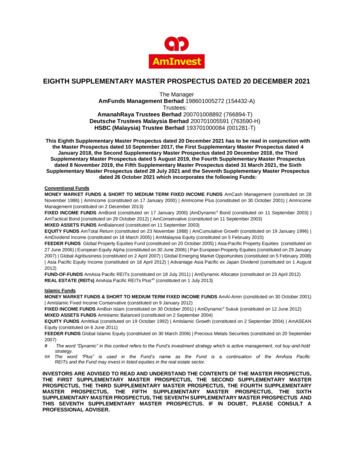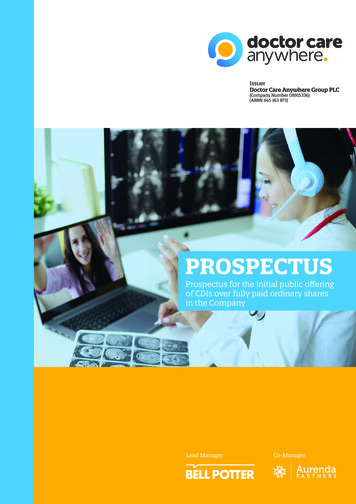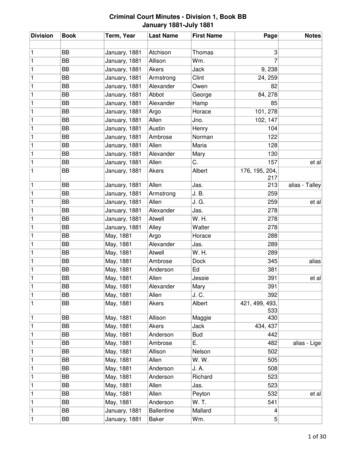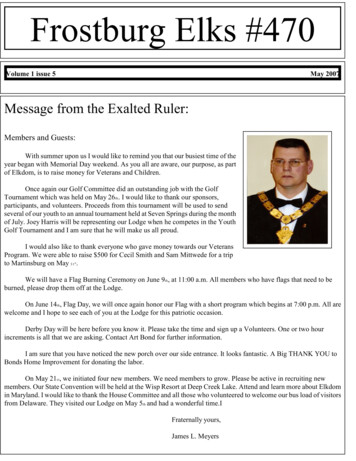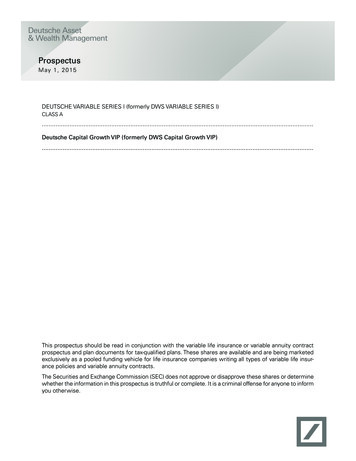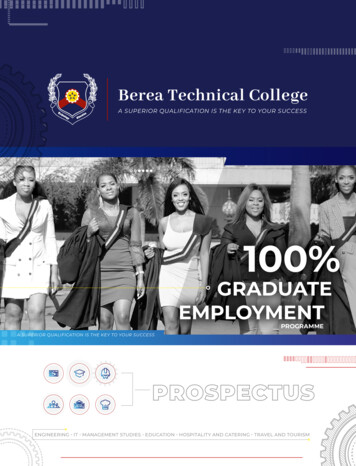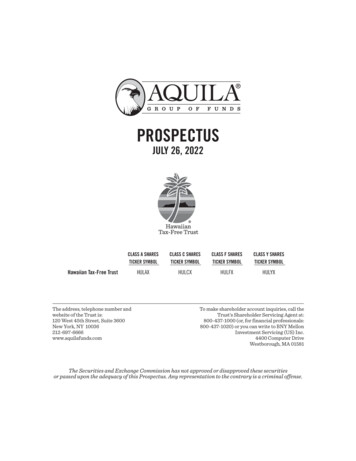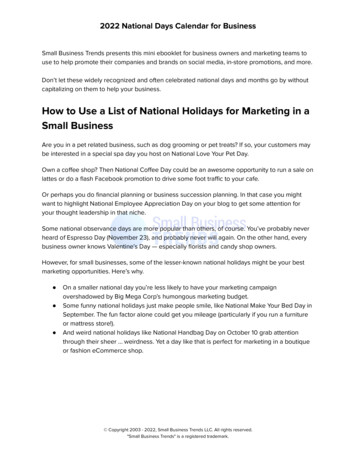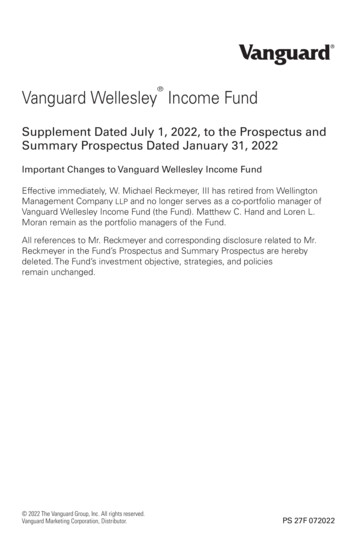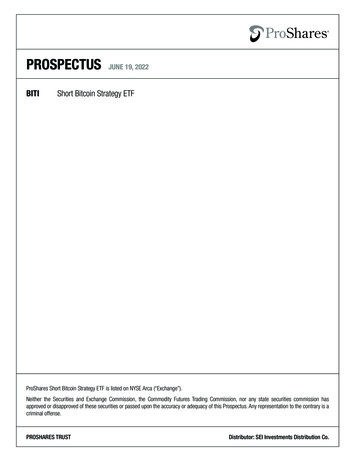
Transcription
Metro North Mental HealthRecovery Support – Courses and ResourcesProspectus January – June 2022
Contents1Acknowledgement of Traditional Owners . 2Section 1: Understanding the experience of mental health challenges and their treatment . 5Section 2: Symptom Management & Therapy-based Programs . 7 Eating Disorders Supports . 7 Psychological Intervention Based Groups . 11Section 3: Peer programs and how to get involved in our service . 17 Volunteer Program . 17 Consumer and Carer Individual Support Services . 17Section 4: Carer Support Programs. 19Section 5: Rebuilding your life . 21 Aboriginal and Torres Strait Islander Communities . 21 Art visual and performance activities . 23 Employment Support and Skills . 25 Gambling Support . 26 Healthy Living, Exercise and Lifestyle . 27 LGBTIQ Friendly Programs . 31 Music Groups . 32 Practical Living Skills . 35 Parenting, Youth and Family Supports . 38 Programs for People from Culturally and Linguistically Diverse Backgrounds. 43 Programs for Elder Persons . 46 Social Groups and supports . 48 Substance Support (Alcohol Drugs and Tobacco). 50 Suicide Prevention and Support . 52 Surviving Sexual Abuse . 53Section 6: Service Hubs . 54Integrated Mental Health Service Hubs . 54What They Do . 54Eligibility . 54Referral Pathways . 54 Service Directory . 55 National help lines and websites . 57. 61. 61. 611300 MH CALL: Mental Health Access Line . 63The 1300 MH CALL service: . 631
Welcome to the Prospectus: January – June 2022This booklet contains a wide range of recovery focused courses and programs aimed atsupporting people to manage with the mental health challenges they experience andachieve the things they want out of life. A personally meaningful and satisfying life ispossible despite mental health challenges.The Prospectus is also available on the following website www.mymentalhealth.org.auThis website contains information about other mental health services, as well ascommunity services and resources.Acknowledgement of Traditional OwnersMetro North Health respectfully acknowledges the Traditional Owners of the land on which our services and eventsare located. We pay our respects to all Elders past, present and future and acknowledge Aboriginal and Torres StraitIslander people across the State.How do I register for a course?Phoning the contact number of the course to directly apply. (Please note some courses have limitationson eligibility due to catchment areas or other specific requirements)If you have general questions about registering or any content in the Prospectusplease call 3139 4101 for more information.There are many places to access free WIFI in Brisbane. City Council libraries for example and they alsooffer a comprehensive range of free workshops for people of all ages and skill levels. The Tech Connectprogram provides an opportunity for participants to learn new skills for using technology such ascomputers and devices, internet and email, as well as social media. The sessions provide the informationand hands-on training you need to use and access technology for communication and enjoyment.Each session is delivered by library staff in a small, friendly and accessible group where you can learn atyour own pace.*Please be advised that although care is taken to ensure the accuracy of all informationincluded, this publication is compiled via an expression of interest process, the ResourceTeam cannot take responsibility for any incorrect information provided by organisationslisted within.2
The front cover artwork titled ‘Stamp Tree’ was created by Adam Goddard. “As a project for reproducingstamps I chose ‘A Tree in the Outback’. When doing my art, I like to use bright and cheery colours. Thevibrant blue sky is my favourite part of this picture and I’d like to think my artwork cheers people up. I’d liketo get 1000 for it, but I will accept the face value of 25 cents!”Are you nervous about participating?Or do you have any concerns about coming along to the programs?Many participants are nervous about joining a program for the first time. Some people find itdifficult talking in a group or being in a group, due to factors like loss of confidence. Some peoplefind it difficult to concentrate because of the difficulties they are experiencing and are worried thatthey won’t be able to follow the entire program. It’s quite normal for participants to be nervous orworried about attending a course.All program facilitators are there to support you.If you would like extra support or to discuss your concerns, please contact the ProgramCoordinators on the numbers provided.Published by the State of Queensland (Metro North Hospital and Health Service), December 2021This document is licensed under a Creative Commons Attribution 3.0 Australia licence.To view a copy of this licence, visit creativecommons.org/licenses/by/3.0/au State of Queensland (Metro North Hospital and Health Service) 2022You are free to copy, communicate and adapt the work, as long as you attribute the State of Queensland(Metro North Hospital and Health Service).For more information, contact:Metro North Health, 490 Hamilton Rd, Chermside, Qld 4032, emailRecovery Suppport Services@health.qld.gov.au, phone 3139 4101 for the Metro North Mental HealthResource Team.An electronic version of this document is available at www.mymentalhealth.org.auDisclaimer:The content presented in this publication is distributed by the Queensland Government as an information source only. The State of Queensland makes no statements,representations or warranties about the accuracy, completeness or reliability of any information contained in this publication. The State of Queensland disclaims allresponsibility and all liability (including without limitation for liability in negligence) for all expenses, losses, damages and costs you might incur as a result of theinformation being inaccurate or incomplete in any way, and for any reason reliance was placed on such information.3
Brisbane North PHNMy Mental Health Service NavigationIf you, or someone you care for needs help accessing or navigating mental health servicesin the Brisbane North region, we can help connect you with the right supports at the righttime.An initiative of Brisbane North PHN, My Mental Health Service Navigators are a team of healthprofessionals standing by to assist callers to navigate the region’s mental health services.Consumers, carers, referrers and providers can contact the My Mental Health Service Navigatorsfor information about mental health services and supports in the North Brisbane and Moreton Bayregion.The Service Navigators can provide referrals to PHN commissioned services using the My MentalHealth Services eReferral.To contact the My Mental Health Service Navigation team;Phone 1800 752 235Email navigation@brisbanenorthphn.org.auWebsite mymentalhealth.org.auFacebook @MyMentalHealthNB4
Section 1: Understanding the experience of mental health challengesand their treatmentMNMHArt Therapy to Support Mental Health and WellbeingArt as therapy? Find out how art, and the process of using art materials, can support people to gain control andconfidence in managing their mental health. Art can provide relaxation, be a social connector, allow expression andact as a therapeutic outlet.Peta Mitchell is the artist in residence at Metro North Mental Health. She has been working with adults in thecommunity and on the wards for the last 13 years. She is passionate about Recovery and assisting people to use artas their medium on their recovery journey.DateTimeVenueWednesday 23rdFebruary12:55 pm for a 1 pmstartRBWH Education CentreNamePhoneEmailImani Gunasekara3114 0801imani.gunasekara@health.qld.gov.auHow to RegisterPhone or email, Consumer Carer Coordinator - ImaniIn person programMNMHSurviving TraumaSeventy percent of all people will experience trauma at some time in their lives, and ninety percent of people withmental health challenges have survived trauma. This session will explore Trauma Informed Care (TIC) and how it cansupport people who have experienced trauma.It’s important to note that Trauma Informed Care is not the same as trauma therapy. TIC is a set of principles thatacknowledge what happened to the person rather than what is wrong with the person.In this session we will explore what is TIC, practical strategies for dealing with the effects of trauma, the neurobiologyof trauma, post-traumatic growth and recovery plans for surviving trauma.This session will be presented by Laura Freeburn – Nurse Educator and Imani Gunasekara – Consumer CarerCoordinator. Imani has a lived experience of mental health challenges as well as a Bachelor of Science, a GraduateDiploma of Science Communication, and a Diploma of Education. She is a daughter, sister, aunt and friend. Laurahas been working in mental health for a number of years, with a Bachelor of Nursing and a Masters in Public Health,and has recently worked on a Trauma Informed Care project within the service.In person programDateTimeVenueWednesday 23rdMarch12:55 pm for a 1 pmstartRBWH Education CentreDateTimeVenueWednesday12:55 pm for a 1 pmstartMicrosoft TeamsNamePhoneEmailImani Gunasekara3114 0801imani.gunasekara@health.qld.gov.auVirtual program23rd MarchHow to RegisterMNMHPhone or email, Consumer Carer Coordinator - ImaniSensory Approaches for Dealing with Trauma, Anxiety, Depression and PsychosisThis presentation will explore how using sensory input in our everyday lives can be an effective way to manage intimes of stress and to improve our mood in the moment. By doing so, we can increase feelings of confidence and theability to participate in activities and routines that are importance to us, thereby improving our quality of life.The application of sensory approaches will be discussed with reference to a number of mental health issues, includingdepression, anxiety, psychosis & the experience of stressful & traumatic events.Sally Mercier is an Occupational Therapist who has completed a few projects and provided training in the area of5
sensory modulation. Sally has been at Metro North Mental Health Royal Brisbane & Women’s Hospital since 2008.During this time, she has had the opportunity to work with people in areas including community & inpatient clinicalservices, psychoeducation, and supervision. Sally is interested in the benefits of utilising sensory based interventionsand techniques in all phases of an individual’s recovery, and actively supports people to develop their knowledge andskills in this intervention area.In person programDateTimeVenueThursday 21stApril12:55 pm for a 1 pmstartRBWH Education CentreNamePhoneEmailImani Gunasekara3114 0801imani.gunasekara@health.qld.gov.auHow to RegisterAlso Virtual on Microsoft TeamsPhone or email, Consumer Carer Coordinator - ImaniMNMHDialectical Behaviour Therapy for Personality DisordersIn this session we will explore: Biosocial Developmental Model of BPD (what is BPD and how does it develop?) Dialectical Patterns (How does BPD present?) An adherent DBT Program (Components of a BPD program) Referral Process for treatmentIn person programDateTimeVenueThursday 19thMay12:55 pm for a 1 pmstartRBWH Education CentreAlso Virtual on Microsoft TeamsNamePhoneEmailImani Gunasekara3114 0801imani.gunasekara@health.qld.gov.auHow to RegisterPhone or email, Consumer Carer Coordinator - ImaniMNMHConsumer and Carer Forum: Managing Anxiety12:30 – 1:15 What is anxiety? Presented by Dr Maneesh DhingraThis session will help you to better understand your anxiety symptoms, their purpose, their causes, and the role ofthought disorders. Dr Dhingra is a Psychiatrist working at RBWH for more than 10 years in General Adult Psychiatry.His areas of interest are anxiety and mood disorders.1:15 – 2:00 Sensory approaches for managing anxiety. Presented by Eleanor FlemmingThis session will introduce you to an emerging evidence-based intervention in mental health -Sensory Approaches.Sensory Approaches can assist people to regulate their feelings and ability to cope in challenging situations byproviding alternatives for reducing distress that focus on the senses. Eleanor is an Occupational Therapist who worksin the Homeless Health Outreach Team. She uses sensory approaches to assist consumers manage their distress,anxiety and optimise their daily functioning.2:25 – 3:10 Challenging negative thinking. Presented by Mary BolesThis session will help you understand what negative thinking styles are, how they can impact on your anxiety as wellas ways of challenging these negative thoughts to better manage anxiety. Mary is a psychologist and mental healthclinician working in community mental health. She has completed her Masters in Clinical Psychology and also has aninterest in evidence based treatments for the management of anxiety and mood disorders.3:10 – 3:55 Practical strategies for coping with anxiety. Presented by Dr Lena ZhangThis session covers some hands-on, practical strategies that we can use to cope when anxiety strikes. Lena is amental health clinician with the RBWH. She has a doctorate in Clinical Psychology, and she is interested in evidencebased treatments to deal with mood and anxiety disorders.In person programDateTimeVenue6
Thursday 16thJune12:25 pm for a 12:30startRBWH Education CentreAlso Virtual on Microsoft TeamsNamePhoneEmailImani Gunasekara3114 0801imani.gunasekara@health.qld.gov.auHow to RegisterPhone or email, Consumer Carer Coordinator - ImaniSection 2: Symptom Management & Therapy-based Programs Eating Disorders SupportsQueensland EatingDisorder Service(QuEDS)Day ProgramThe Day Program offers more intensive support for clients with eating disorders who are struggling with their currentlevel of community treatment and provides much needed meal support several days per week in an outpatient setting.Clients (16 years and over) attend therapeutic groups, such as CBT-E, DBT skills, Schema and Sensory andsupported meals facilitated by a specialised multidisciplinary team. Therapeutic groups focus on practical (e.g. foodpreparation), psychological (e.g. challenging food rules) and nutritional (e.g. improving variety in eating) aspects ofrecovery.Family involvement is strongly encouraged. Families can access individual single session family consultations andevening skills group for support. The Day Program is publicly funded with only minor costs for clients.Referrals forms are available from the QuEDS website reservices/eating-disorder. Please note clients under 18 years old require a referral from CYMHS services or privateChild and Adolescent Psychiatrists, Clients over 18 require a GP referral. Criteria for referral is BMI 16 or above andmedically stable.DateTimeVenueProgram runs four times percalendar year. Program requires a13-week commitment from entry toexit appointments.8 Weeks of full days - Monday,Tuesday, Thursday, and Friday.Entry and exit appointments in the2 weeks with side of the program.2 Finney Road, IndooroopillyNamePhoneEmailQuEDS Intake Service3114 0809QuEDS@health.qld.gov.auHow to RegisterReferrers to complete QuEDS Referral Form found on QuEDS ealthcare-services/eating-disorder which canbe faxed to 3100 7555 or emailed to QuEDS@health.qld.gov.auEating Disorders QldCommunity TableThis group is designed for those with a variety of eating disorders. As part of each session, the group shares a meal,which is provided by EDQ. The Community Table uses a semi-structured approach, allowing time for pre- and postmeal activities, as well as the flexibility to explore a variety of different topics and skills that may be beneficial torecovery. The Community Table is a closed group of 6-8 individuals, who meet once a week for 5 weeks. The groupsessions are three hours in length and currently run over the lunch period.There are many reasons to join The Community Table: Receive support and understanding from Eating IssuesPractitioners and your peers, Work towards personal goals around nutrition, Rediscover your relationship with food,Explore different skills to manage intrusive thoughts and feelings that accompany eating, Try new activities that may behelpful during the challenging pre and post mealtimes.In person programNameDateTimeVenueTBA11am – 2pmEating Disorders Qld, 51 EdmondstoneStreet, South BrisbanePositionPhoneEmail7
Laura OakleyPractice Coordinator3844 6055admin@edq.org.auHow to RegisterPlease contact Eating Disorders Queensland on 3844 6055 or admin@edq.org.auEating Disorders QldCarer ConnectThe Carer Connect Support Group provides a supportive and collaborative environment for family members, carers,and key support people to come together and is facilitated by EDQ Family & Carer Coaches.The group is run monthly at EDQ from 6:30pm to 8:30pm and focuses on different themes/topics each month,including guest speakers. The group aims to be informative and to support families and carers to support their lovedones. The evening is an opportunity to connect with others who are going through a similar journey and to heardifferent experiences and insights. Feedback from people who have attended Carer Connect evenings includes“connection with others who understand”, “nice to meet people who have been through the same thing”, “everyone isopen, caring, supportive, no judgement.”In person programDateTimeVenueTBC6.30pm – 8.30pmEating Disorders Qld, 51 EdmondstoneStreet, South BrisbaneNamePositionPhoneEmailLaura OakleyPractice Coordinator3844 6055admin@edq.org.auHow to RegisterPlease contact Eating Disorders Queensland on 3844 6055 or admin@edq.org.auEating Disorders QldCarer Peer Mentorship Program (CPMP)Our Carer Peer Mentor Program connects Queensland carers to be mentored by other carers who have supported aloved one with their recovery. All carer mentors are extensively trained to provide non-clinical, additional support.Each program meets at EDQ up to three times in a six-month period, with weekly contact between matched mentorsand mentees encouraged.In person programDateTimeVenueJanuary to mid-JuneTBAEating Disorders Qld, 51 EdmondstoneStreet, South BrisbaneNamePositionPhoneEmailRohie MarshallPractice Coordinator3844 6055admin@edq.org.auHow to RegisterPlease contact Eating Disorders Queensland on 3844 6055 or admin@edq.org.auEating Disorders QldFostering RecoveryThe Fostering Recovery Workshop is an evidence-based 1-day workshop that aims to help family members, carersand key support people increase their understanding of eating disorders and ways to support their loved one’srecovery. Based on the work of Professor Janet Treasure, you’ll learn how to make mealtimes less stressful, positivecoping strategies and communication skills, and foster a healthier relationship with your loved one.Feedback about the workshop includes “I feel much more empowered after the workshop and have more confidence inmy ability to tackle the challenges ahead ” and “excellent content & delivery, clear explanations & examples. Use oftime for discussion was well managed”.The online version of the workshop is split into three sessions, held in the evenings for convenience.In person programDateTimeVenueTBA (Saturday)TBAEating Disorders Qld, 51 EdmondstoneStreet, South BrisbaneNamePositionPhoneEmailLaura OakleyPracticeCoordinator3844 6055admin@edq.org.auHow to RegisterPlease contact Eating Disorders Queensland on 3844 6055 or admin@edq.org.au8
Eating Disorders QldPeer Mentorship ProgramThe EDQ Mentoring Program supports people who are recovering from eating issues by partnering mentees withmentors who have recovered from an eating issue. Successful mentoring requires thorough training through ourprogram and a commitment to regular mentoring contact agreed to by mentor and mentee for a six-month period.The design and structure of the Peer Mentor program is based on best practice national and international standardsfrom other mentoring programs. Data and feedback from the program undergo ongoing evaluation to improve theprogram and the experiences of participants. The program runs in two batches per year. Each program includes up tothree sessions at EDQ, with weekly contact encouraged between the matched mentors and mentees.In person programDateTimeVenueFebruary to mid-JuneTBCEating Disorders Qld, 51 EdmondstoneStreet, South BrisbaneNamePositionPhoneEmailLaura OakleyPractice Coordinator3844 6055admin@edq.org.auHow to RegisterPlease contact Eating Disorders Queensland on 3844 6055 or admin@edq.org.auEating Disorders QldPeer Support GroupThe Peer Support Group aims to provide those in recovery with an opportunity to connect with other peers who haveshared similar experiences. Groups will be facilitated by EDQ staff with lived experience, who will work alongsidegroup participants to find solutions to common problems and help to navigate the pathway to recovery.Each session is based on group-led discussion, aiming to foster and support recovery and offer an opportunity toconnect with others who also have experience of eating issues and/or recovery. Each group contains at least one EDQworker with lived experience, who helps to ensure that conversations are safe for all participants.Participants can choose which sessions to attend, and sessions are open to all stages of recovery, and all types ofeating issues.In person programDateTimeVenueJanuary –June (Monthly)5.30pm – 8pmEating Disorders Qld, 51 EdmondstoneStreet, South BrisbaneDateTimePlatform13th January – 16thJune (Monthly)5.30pm – 7.00pmZoomNamePositionPhoneEmailLaura OakleyPracticeCoordinator3844 6055admin@edq.org.auHow to RegisterPlease contact Eating Disorders Queensland on 3844 6055 or admin@edq.org.auEating Disorders QldTherapeutic Group for Eating Disorders20thVirtual program30thThe EDQ therapeutic group program runs weekly for 10 weeks. This is a closed group and participants are expectedto commit to attending all 10 sessions.The group is for individuals living with an eating disorder and allows participants to explore shared themes related toeating disorders, reduce isolation and shame and build relationships with peers. The group is held over 10consecutive weeks in the evening and will be held twice in this period – one in person group, and one online group.In person programVirtual programNameDateTimeVenueTBA – Tuesday nights5.30pm –8.30pmEating Disorders Qld, 51Edmondstone Street, South BrisbaneDateTimePlatformTBA – Tuesday nights5.30pm – 7pmZoomPositionPhoneEmail9
Laura OakleyPractice Coordinator3844 6055admin@edq.org.auHow to RegisterPlease contact Eating Disorders Queensland on 3844 6055 or admin@edq.org.auEating Disorders QldTrauma - Informed YogaA six-week yoga group which aims to give people a foundation around Yoga, the important philosophical elementsthat guide practice and how yoga can support recovery from eating disorders.Recovery from an eating disorder often involves a process of reconnection to body. A yoga practice can be a way forpeople to make peace with the body, reclaim the body, and learn that the body can be reliable and safe again.Each week we connect with our body through practices of movement, breathing, meditation and relaxation.Compassion and kindness for self are key underlying principles for the practice. This is all facilitated throughgentleness, with varying options and choice provided that enable people to go at their own pace and comfort level.The practice of Yoga also enhances other recovery tools such as talk therapy and other treatment modalities.These yoga classes are taught from a trauma informed and mental health perspective. All are welcome. No prioryoga experience required.In person programDateTimeVenueTBATBAEating Disorders Qld, 51 Edmondstone Street,South BrisbaneNamePositionPhoneEmailLaura OakleyPracticeCoordinator3844 6055admin@edq.org.auHow to RegisterPlease contact Eating Disorders Queensland on 3844 6055 or admin@edq.org.auCommunify Recovery &Discovery CentreRecovery WarriorsRecovery Warriors introduces participants to varied therapeutic and support interventions- a prelude to EDQ’s morestructured recovery programs. The group also provides participants with ongoing recovery skills and reminders tohelp ‘scaffold’ your recovery pathway.If you are awaiting therapeutic supports, want to explore recovery concepts, not sure if you need or want support orjust want to connect with others impacted by eating disorders then this group is for you. The monthly group includesactivities and strategies for coping and staying connected. The group aims to support clients until they can move ontomore intensive therapy and support services. Participants can choose to attend each group on a month-by-monthbasis. The Recovery & Discovery Centre program is designed to work for a broad range of people, but especially forthose who are not receiving mental health supports elsewhere.In person programDateTimeVenueTBC - Runs Monthly5.30pm to 7.30pmEating Disorders Queensland51 Edmondstone Street, South BrisbaneNamePositionPhoneEmailRohie MarshallP
(Metro North Hospital and Health Service). For more information, contact: Metro North Health, 490 Hamilton Rd, Chermside, Qld 4032, email Recovery_Suppport_Services@health.qld.gov.au, phone 3139 4101 for the Metro North Mental Health Resource Team. An electronic version of this document is available at www.mymentalhealth.org.au Disclaimer:
